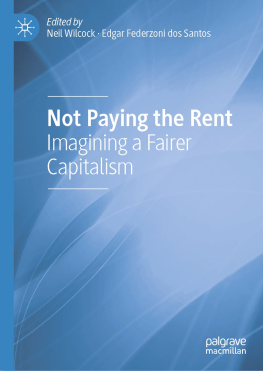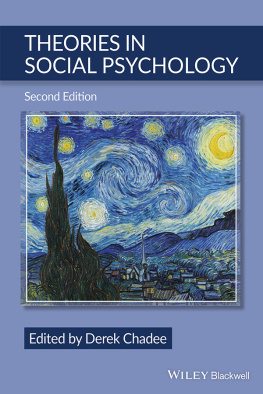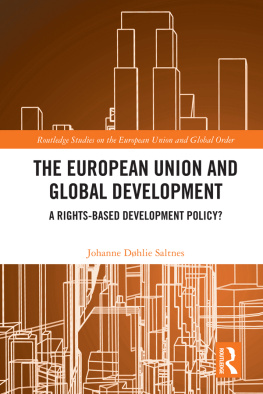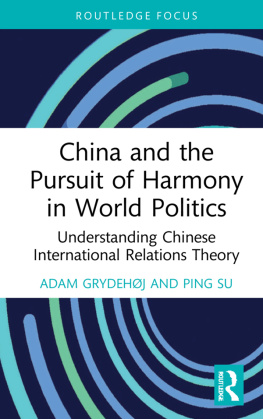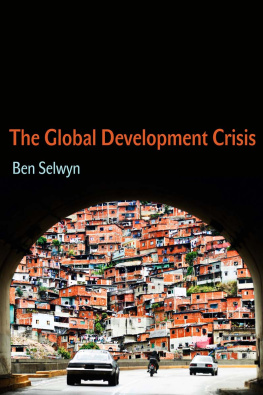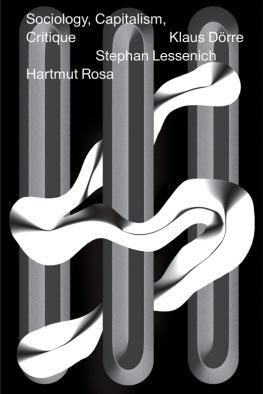Hartmut Elsenhans and a Critique of Capitalism
Hartmut Elsenhans and a Critique of Capitalism
Conversations on Theory and Policy Implications
Neil Wilcock and Corina Scholz
University of Leipzig, Germany


Neil Wilcock and Corina Scholz 2016
Foreword Hartmut Elsenhans 2016
All rights reserved. No reproduction, copy or transmission of this publication may be made without written permission.
No portion of this publication may be reproduced, copied or transmitted save with written permission or in accordance with the provisions of the Copyright, Designs and Patents Act 1988, or under the terms of any licence permitting limited copying issued by the Copyright Licensing Agency, Saffron House, 610 Kirby Street, London EC1N 8TS.
Any person who does any unauthorized act in relation to this publication may be liable to criminal prosecution and civil claims for damages.
The authors have asserted their rights to be identified as the authors of this work in accordance with the Copyright, Designs and Patents Act 1988.
First published 2016 by
PALGRAVE MACMILLAN
Palgrave Macmillan in the UK is an imprint of Macmillan Publishers Limited, registered in England, company number 785998, of Houndmills, Basingstoke, Hampshire RG21 6XS.
Palgrave Macmillan in the US is a division of St Martins Press LLC,
175 Fifth Avenue, New York, NY 10010.
Palgrave Macmillan is the global academic imprint of the above companies and has companies and representatives throughout the world.
Palgrave and Macmillan are registered trademarks in the United States, the United Kingdom, Europe and other countries.
ISBN 9781137564634
This book is printed on paper suitable for recycling and made from fully managed and sustained forest sources. Logging, pulping and manufacturing processes are expected to conform to the environmental regulations of the country of origin.
A catalogue record for this book is available from the British Library.
Library of Congress Cataloging-in-Publication Data
Hartmut Elsenhans and a critique of capitalism : conversations
on theory and policy implications / Neil Wilcock, Corina Scholz.
pages cm
ISBN 9781137564634
1. Capitalism. 2. Elsenhans, Hartmut, 1941Interviews. I. Wilcock, Neil, 1987 interviewer, editor. II. Scholz, Corina, 1985interviewer, editor. III. Elsenhans, Hartmut, 1941 interviewee.
HB501.H35876 2016
330.122dc23
2015025928
Contents
Foreword
Hartmut Elsenhans
The idea for this book originated from Corina Scholz and Neil Wilcock. They approached me to present my theories on capitalism, growth, the emancipatory class struggle and the future of the international system from an introductory perspective. Having been my students and also enrolled in a masters programme that had to tackle my theories, they are able to present my work from a totally different perspective than I am: they know from their own experience and from the experience of their colleagues what the challenges are in understanding these theories. The fact that Corina and Neil have been able to prepare this book demonstrates that the difficulties in understanding these theories could be overcome provided they focused on my basic concepts and arguments. They pick out some central concepts and arguments, which could be problematic for the reader, and concentrate on making these concepts and arguments clear with respect to their connections with other elements within these theories.
In their efforts to present these theories in a novel way, Corina and Neil are more able than me to focus on the elements that are more challenging to readers. With each chapter delving into a different theoretical aspect, from both a theoretical and practical dimension, the book will serve as a source of interest not only for my students, but also for a wider academic audience interested in any one of the ten topics discussed. I am very thankful to them for this endeavour.
The history of the struggle of ideas in Western academia is full of cases where undesirable theories are silenced by declaring them as incomprehensible. Authors are unable to argue against such criticisms as their explanatory responses are classified by their detractors as even more unintelligible. I hope the explanations from the perspective of the young scholars, as represented by the questions and discussions with Corina and Neil within, can contribute to overcoming this issue.
Indeed, throughout my teaching, students have maintained interest in my arguments, whereas colleagues who had vested interests in the existing dominant and mainstream critical theories regularly assumed that my critical positions were best relegated to the archives, if not into more unknown and dark places. Colleagues have felt so sure of my errors that they have not refrained from writing such statements in official replies from purported objective academic institutions, such as promotional institutions or bodies charged with academic staff development. Such episodes worry me that academic freedom is becoming the freedom of the powerful who remain powerful by limiting questioning the very basis of academic enquiry.
I agreed to participate in this book by offering myself up for interviews and made no stipulations on what could or could not be asked, the questions were all at the discretion of Corina and Neil. I found the experience a pleasant contrast to the anti-innovation positions held in many of the social sciences, where there is a lack of questioning of basic assumptions with them being replaced by theatrical, superficial discussions that seem more akin to debates about the number of legs on a centipede than a serious academic debate. I believe this combination of rigidity and timidity constitutes a threat to academia and to discovery.
Turning to my theory, I introduce a perspective to readers that is at odds with established mainstream assumptions: capitalism is neither a historical necessity nor the result of a necessarily evolving historical process of socialisation and technical development. Rather, capitalism is the accidental result of the capacity of the lower strata to impose their participation in the gains of technical innovation by raising their mass incomes. The lower strata, the oppressed classes of precapitalist societies, had no intention of creating capitalism. There was no blueprint of the future society in Europe when the incomes of the poor increased. However, increasing mass incomes of the poor not only reduces the amount of surplus the ruling classes can use for the most diverse purposes, from war armaments to works of art, but it also changes the conditions of access of members of the ruling class to the surplus. The technically more efficient members of the ruling class, normally the less privileged ones who opt to go into trade and capitalist production, can disestablish centralised power-based strategies of exploitation so that decentralised access to surplus through market competition on the basis of technical efficiency can upset the normal power struggles in the ruling classes and shift the power in society away from rigid ruling classes. The resistance of the lower strata against exploitation and immiseration creates the conditions for the emergence of the bourgeoisie. Profit depends on investment spending, as profit has to be realised on markets instead of being appropriated by increases in unpaid work time by the powers that be. Investment is possible if there are products in demand that are produced by means of investment goods, especially machinery, and positive net investment in excess of replacement of worn-out investment goods requires increasing demand of such products.
Next page

